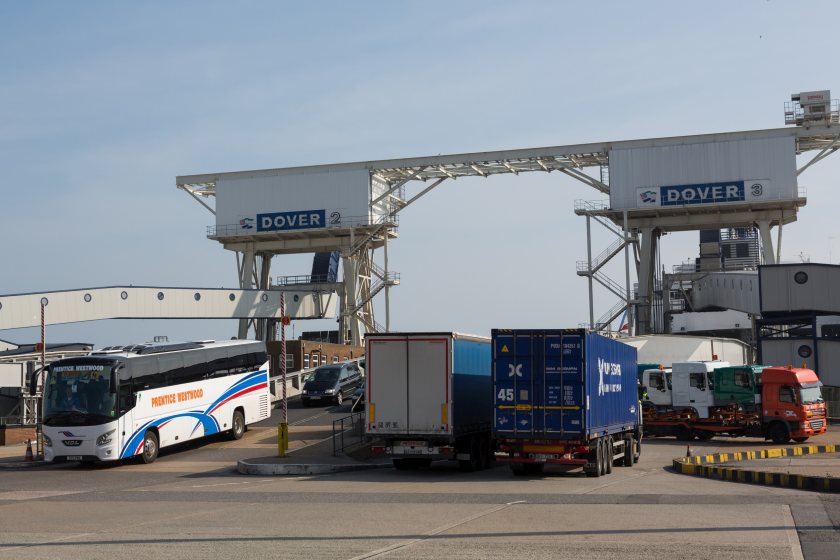UK and EU agree deal to slash agricultural export red tape

The UK and EU have struck a fresh deal to ease post-Brexit trade friction, cutting red tape on agri-food exports with a new agreement on plant and animal health standards.
Prime Minister Sir Keir Starmer described the agreement as a 'historic' shift and a 'reset' he had pledged following Labour's general election victory last July.
He said the deal would clear the path for removing barriers on British food exports — making it easier to sell everything from the “great British burger to shellfish” across the EU.
The agreement, unveiled on Monday (19 May), addresses the impact of these non-tariff barriers through the introduction of a sanitary and phytosanitary (SPS) framework.
The move would effectively eliminate the need for border controls on agri-foods traded between the UK and the EU.
In exchange, the UK will agree to a degree of dynamic alignment with EU food standards and accept a role for the European Court of Justice in overseeing the agreement.
Controversially, today's deal also includes granting EU fishing rights for an extra 12 years — a longer period than previously proposed by the UK.
Sir Keir Starmer said: “It’s time to look forward. To move on from the stale old debates and political fights to find common sense, practical solutions which get the best for the British people."
"We’re ready to work with partners if it means we can improve people’s lives here at home."
If fully implemented, the SPS agreement would mean UK alignment with current EU standards, as well as a reduction in post-Brexit red tape for trade in fruit, vegetables, cut flowers and plants.
However, no timeline on its roll out was provided, meaning current controls - such as veterinary checks, export health certificates (EHC) and administrative red tape - remain in place for now.
The EU continues to be the UK’s most important market for agri-food exports: between 2022 and 2024, the bloc accounted for the bulk of UK red meat and dairy exports.
This is despite that, over the past five years, UK agri-food exports to the EU have stagnated with double digit reductions in exports volumes across a variety of farming sectors.
According to AHDB analysis, the EU remains a key opportunity for UK exporters due to long-standing supply chains, established markets, and strong commercial relationships.
Research by the levy organisation found non-tariff measures have increased export costs by 5–8% for livestock and 2–5% for plant-based products, hitting smaller exporters hardest.
Sarah Baker, head of economics at AHDB said: “Since leaving the EU, added trade friction has disproportionately impacted SME export businesses, most notably with the amount of red tape creating challenges around groupage.
"With recent headlines highlighting trade arrangements with the US, it remains important not to overlook the EU market.
"The EU market is and will remain our key trading partner due to our proximity to market and established supply chains.
"Any agreement that lowers trade friction, smoothing trade between the UK and the EU would be good news for UK agricultural exporters.”
Echoing this sentiment, Ouafa Doxon, AHDB head of market access, highlighted the bloc's continued importance as one of the UK’s largest trading partners.
She said today's summit between the prime minister and EU officials was a critical opportunity to address the trade barriers that have emerged since Brexit.
"These discussions reinforced the importance of cooperation in addressing market access challenges and improving the flow of goods," she added.
"Constructive dialogue at this summit could help streamline processes and explore solutions such as an SPS agreement, while respecting the UK’s regulatory autonomy.
"Such progress would be instrumental in facilitating smoother trade flows and ensuring long-term stability for the UK meat industry."
NFU president Tom Bradshaw said the government’s ambition to make it easier for the sector to trade with its largest overseas partner was welcome.
"We have always sought a strong trading relationship with the EU which reduces friction at a time of global instability," he added.
"But since 2020, farming and growing businesses have been faced with significant costs, burdensome paperwork and additional checks in order to trade with partners on the continent."
However, he said there were important questions about what is within the scope of this agreement and, where current rules and regulations do differ, if there would be any exclusions.
He said: "As negotiations in this area continue, it’s vital that our government safeguards the progress we have made in policy areas such as precision breeding to enable the farming sector to continue to move forward in sustainable, resilient and innovative food production."
The Country Land and Business Association (CLA), which represents thousands of farmers and landowners, cautiously welcomed the outcome of the summit, but warned over further integration into the EU.
"We need immediate reassurance that the UK will have a voice in the decision-making process in the sanitary and phytosanitary agreement," said CLA president Victoria Vyvyan said.
“Although the EU is a key market for UK produce, and lower export costs would help make our goods more competitive, signing up to allow the European Court of Justice to impose decisions affecting our goods is an unnecessary surrender of control.
“Cutting red tape on food exports and plant and animal health for trade sounds positive if unlikely, but tying us to an agreement that involves European Court of Justice oversight is deeply concerning.”








